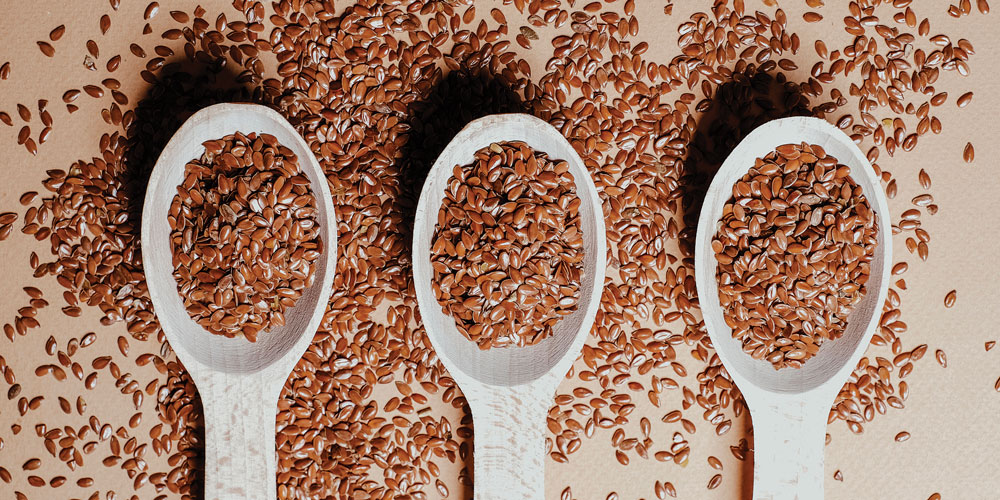
The facts about FLAX
By incorporating flaxseed into meals, you can enhance your overall health and well-being
Flaxseed, also known as ‘aldi’, ‘tisi’ or ‘linseed’, are often referred to as a ‘nutritional powerhouse’ or a superfood, because they are a rich source of essential nutrients such as omega-3 acids, which help to lower cholesterol. Studies also suggest that flaxseed may help lower blood pressure, contributing to improved cardiovascular health.
As BBC Good Food outlines, there are two main types of flaxseeds that are consumed: golden and brown. Their nutritional profile is the same, but they are slightly different in colour and, while they both have a nutty taste, golden flaxseeds are slightly sweeter and brown flaxseeds have more of a toasted flavour.
The site adds that flaxseeds can be grown in the UK as well as globally, so you will find them in-store all year round, but the British flax season is around July to September. Flax plants develop five-petalled flowers that bloom in the summer and then, after pollination, they develop round seed pods that house the flax seeds. When these pods turn yellow, and the seeds rattle inside, they are ready to be harvested.
Nutrition expert Jenny Tschiesche recently teamed up with Irish health food brand Linwoods to explain the powerful nutritional benefits of flaxseeds and share simple, effective ways to incorporate them into daily meals to support overall well-being. Flaxseed has been a staple in various cultures for centuries. “In fact, the Greek physician Hippocrates, known as the father of medicine, used flaxseed to treat a variety of ailments, including digestive issues and skin conditions,” she says.
According to Tschiesche, laws were also passed requiring people to consume flaxseed for its health benefits by King Charlemagne, King of The Franks, in the 8th century. Its resurgence in modern diets is well deserved, she adds, given its impressive nutritional profile and myriad health benefits.
As well as omega-3 fatty acids, the nutritional profile of flaxseed includes dietary fibre, lignans and protein. Lignans are a group of polyphenols found in plants, particularly seeds, whole grains and vegetables, and are known for their potential antioxidant properties. They may even play a role in reducing the risk of certain cancers, according to various studies.
How to incorporate flaxseed into your diet
To ensure high bioavailability of its bioactive components, Tschiesche says flaxseed should be consumed in the milled form. If consumed as whole seed your body won’t fully digest it and therefore you’ll not receive the full range of nutritional benefits. Consuming about one to two tablespoons of milled flaxseed per day is enough to provide a good dose of fibre, omega 3 fatty acids, and other nutrients, while fitting into a balanced diet.
If you’re new to eating flaxseed, however, it’s best to start with a smaller amount, such as one tablespoon per day and gradually build up to two tablespoons per day to avoid any digestive discomfort.
Integrating flaxseed into your meals is both simple and versatile. Times of India recently showcased seven Indian flaxseed recipes to add to your summer menu. These included adding flaxseed to chaas to give them a healthy twist and making a flaxseed chutney.
It said: “Add a spoon of flax magic to your regular green chutney. A blend of coriander, mint, lemon, chillies, and ground flaxseeds turns it into a flavour-packed dip with extra fibre. Spread it on parathas, mix it with curd or use it in sandwiches. It’s a simple way to boost taste and gut health.”
Other dishes featuring flaxseed included flaxseed thalipeeth, where you can add some roasted flaxseed powder into the dough for extra crunch and nutrients and a light flaxseed raita, made by mixing whisked curd with grated cucumber, roasted jeera, flax powder, and a little coriander.
You could also try a spicy flaxseed podi. The article said: “If you’re a fan of podi, try this upgraded version. Dry roast flaxseeds with curry leaves, garlic, red chillies, and urad dal. Grind them into a coarse powder and enjoy with idlis or dosa, drizzled with ghee or sesame oil. It’s punchy, fiery, and a great way to sneak in some omega-3s.”
If you have more of a sweet tooth, flaxseed can easily be incorporated into baked products. For example, says Tschiesche, milled flaxseed can be used in breads, pancakes, muffins, flapjacks (or “flaxjacks”) and cakes to enhance fibre content. And consider adding it to smoothies, muesli, granola and overnight oats and using it as an egg substitute.
“Milled flaxseed can be added to your favourite smoothie for a nutrient boost, or adding milled flaxseed to your muesli, granola or overnight oats mix can bolster its nutritional profile,” says Tschiesche. “Simply combine one tablespoon of milled flaxseed with three tablespoons of tepid water to create a plant-based egg replacement suitable for baking or in
pancakes.”
Images: Linwoods
Read more
K2H Creative asks for payment upfront
Indian restaurant K2H Creative in Cheshire is asking diners to pay for their meals before they sit down, following a spate of people eating and leaving without paying.
A report on Cheshire Live detailed how K2H Creative Indian Kitchen in Sandbach said it has no choice but to refuse service in future to those identified as responsible and to introduce a new payment system due to what it has labelled as ‘repeated exploitation’.
A statement on the restaurant’s Facebook page said: “Regrettably, any individuals identified from previous occasions will be respectfully refused service. We apologise for any inconvenience this may cause, but the repeated exploitation of our hospitality cannot be tolerated.
“In an effort to prevent further misuse of our services, we will soon be implementing a new payment system. Customers will have the option to open a tab using a card swipe or to pre-pay for their meals in cash before being served.
“We understand that this measure is a departure from the typical dining experience, but the recent events have deemed it necessary.”
The majority of people who commented on the Facebook statement said they were all in favour of the new payment system.

Indian restaurants among World’s 50 Best
Two Indian restaurants have been listed among the world’s 50 best, with one making the top ten and the other featured among the top twenty.
The World’s 50 Best Restaurants 2024 list was announced in June in Las Vegas, with Gaggan in Bangkok named at number nine and Trèsind Studio in Dubai ranked at number 13.
Indian restaurants a hit
Gaggan is the brainchild of Kolkata-born Gaggan Anand, who pursued music professionally before starting his culinary career. He went from a trainee position at the luxury hotel chain Taj Group and worked his way up, cooking at the revered El Bulli in Spain alongside Ferran Adrià.
This, says the World’s 50 Best Restaurants, was an experience that sealed his love for molecular gastronomy. He founded his first restaurant in Bangkok, Gaggan, in 2010, which went on to be named The Best Restaurant in Asia four times.
The listing continues: “Gaggan closed in August 2019 and a few months later, the former drummer opened its new incarnation: Gaggan Anand.
The chef is on a mission to push the boundaries of the fine dining experience, seeking to create, “a culinary adventure of the senses and a roller coaster ride of emotions”. The same irreverent philosophy shines through the restaurant’s digital channels, the chef’s hilarious sense of humour and the out-of-the-box presentation of the dishes. In 2024, the restaurant reverted to its previous name, Gaggan.”
Creativity as a main feature
According to the World’s 50 Best Restaurants, Gaggan uses creativity as a main feature. “Music, colours and creativity combine on the menu, which is anchored in progressive Indian cuisine with a fine dining twist, with French, Thai and Japanese influences.
From using emojis to represent each of the courses to pushing diners to eat with their hands or even lick the plate, Anand wants to disrupt and reinvent the fine dining experience.
Indian restaurant Trèsind Studio, Dubai, in at No.13
Trèsind Studio in Dubai was described as ‘an ode to India’s rich and diverse culinary heritage’. The World’s 50 Best Restaurants’ listing says: “From humble beginnings in a backroom of its sister restaurant, Trèsind, Himanshu Saini has steered Trèsind Studio to its current position as one of the world’s most renowned Indian restaurants in less than a decade.
Rather than the often-employed blanket approach to India’s cuisine, Saini and his team guide diners through a nuanced yet approachable exploration of 17 dishes that tell the story of the country’s rich and diverse cultural, agricultural and religious heritage.
“Resembling an intimate theatre, the 20-seater restaurant’s focal point is the open lab-like kitchen where guests can watch each intricately plated dish come to life. Saini is known for incorporating natural elements in his presentation, be it fresh flowers, leaves, shells, butterflies or locally sourced ceramics in organic form. This, combined with clinically precise plating leads to dishes that leave a visual impact long after the final course is served.”
Dishes on the menu are split into four regions: Thar desert, Deccan plateau, Coastal plains and Northern plains & Himalayan mountains. They include Shiso papadum, yogurt crémeux, garden herbs; Missi roti, nopales curry, cultured butter; Ghee roast crab, burnt cinnamon, curry leaf crisp; Pani puri, sparkling sweet lime water, jicama and Lamb kebab, green plum korma, mountain greens.
Masque in Mumbai ranked at number 78
The list of restaurants numbered 51-100 was also revealed with Masque in Mumbai ranked at number 78. Set in a former industrial mill, the restaurant offers a 10-course chef’s tasting menu. Indian Accent in Delhi also made the list, featuring at number 89. The restaurant showcases inventive Indian cuisine by complementing the flavours and traditions of India with global ingredients and techniques. Its Chef’s Tasting Menu features dishes such as ‘chaats from the streets of Delhi’, ‘Kashmiri morel musallam, roast walnuts’ and ‘beetroot chop, pickle eggplant, mustard coconut curry.’

Covid fraud: Jailed restaurant owner given significant financial penalty
The former owner of a Derbyshire curry house who was sent to prison for Covid fraud has been ordered to repay more than £36,000.
Syed Hussain was jailed for 18 months and banned as a company director for three years in August 2023 after admitting charges of fraud by false representation and an offence under the Companies Act.
Hussain fraudulently secured a £50,000 Bounce Back Loan in May 2020 while serving a suspended sentence for breaching fire safety regulations at the former Moja Indian restaurant in Matlock. The 24-year-old then dissolved his Magic of Spice Ltd company on the same day the funds appeared in his bank account.
Hussain, of Provident Street, Derby, was ordered to pay £36,200 during a confiscation hearing at Derby Crown Court in May.
Covid loan: Hussain “exploited” taxpayer backed scheme
Mark Stephens, chief investigator at the Insolvency Service, said: “Syed Hussain’s cynical actions in exploiting a taxpayer-backed scheme introduced at a time of national emergency were completely unacceptable. His behaviour in failing to notify the bank when he was applying to have his company struck off the register was equally calculated and pre-planned.
The Insolvency Service will not tolerate deliberate abuse of the public purse which is why Hussain now faces a financial penalty to go with the time he has spent behind bars.
Hussain applied for the maximum permitted £50,000 loan in May 2020, claiming on the application form that the turnover of Magic of Spice was £200,000. He later said putting this figure down was a mistake.
Hussain said that he had decided to close down the company based on Dale Road in Matlock when he made the application as it had been struggling for the previous year.
The loan application was made by Hussain when he was only months into a suspended sentence for breaching fire safety regulations at his restaurant.
Hussain transferred £30,000 of the loan to two family members who used the money for their own personal spending. A further £10,000 was used for personal expenses such as hotels and car hire. No evidence was provided to the Insolvency Service of the money being used for business purposes.
Hussain also made no repayments to the loan despite this being a condition of the scheme.
Derby Crown Court gave Hussain three months to pay the money or face an additional 18 months in prison. Hussain would still owe the full amount ordered in the event he fails to comply and is returned to prison.
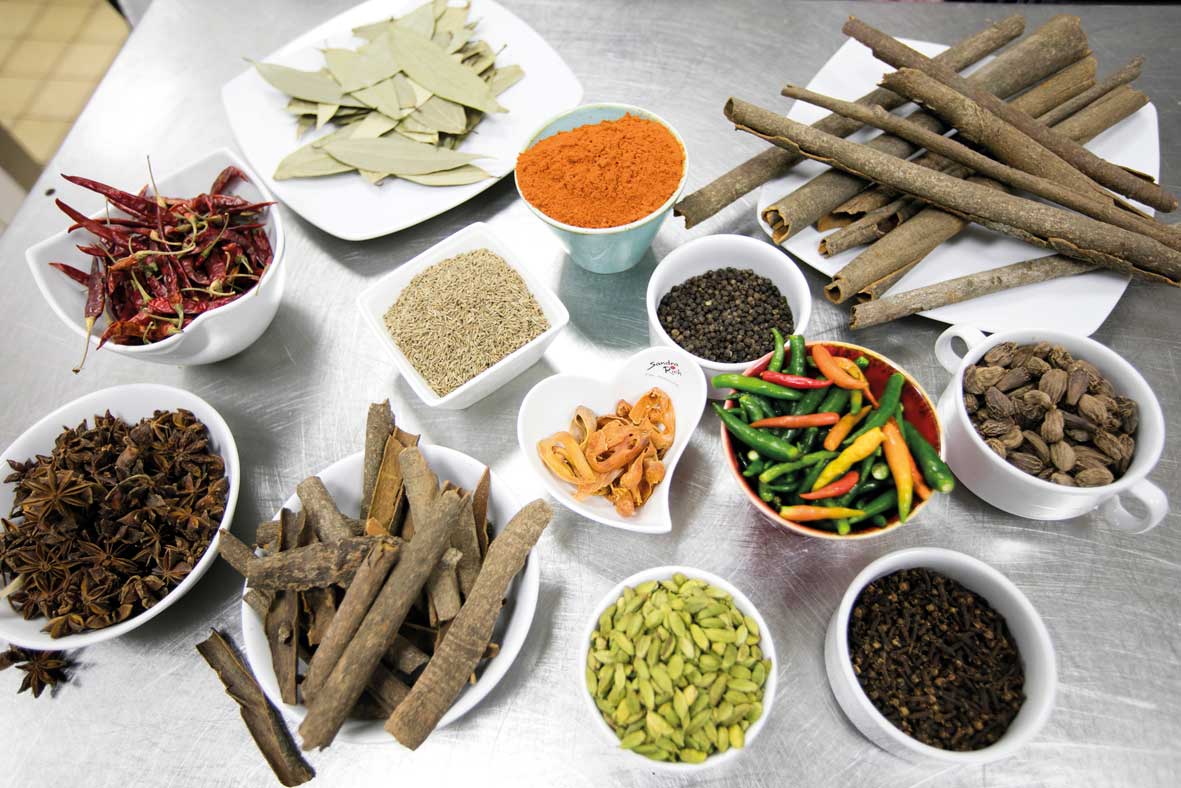
Spices, the essence to Indian food
It is difficult to imagine Indian food without the fragrance and flavours of spices. The tantalizing aromas, vibrant colours, and of course the spicy, sweet and tangy flavours make all dishes stand out.
Often home cooks, who love experimenting with different cuisines and recipes, strike off Indian dishes from their list because of the number of spices used as ingredients. Though it can be a daunting to keep track of all the goes in, the end result can be most satisfying.
The key to successful Indian dishes is using the right spices in accurate amounts. Spices sometimes come in the form of seeds, coarse or fine powder, which is either roasted and ground.
While some curries require strong spices, for others minimal and mild condiments accentuate the dish. There are few spices like jeera (cumin seeds) or dhania (coriander seeds) which have an earthy texture that balance well with the use of onions and tomatoes or sometimes yogurt.
To stock up the right spices, it is essential to know what they are regionally popular as. Here, we put together a list of most used spices and condiments that are used in Indian meals.
• Tulsi – Basil
• Tej Patta – Bay leaf
• Kali Mirch – Black pepper
• Hing – Asafoetida
• Kala Namak – Black salt
• Elaichi – Cardamom
• Ajwain – Caram seeds or Celery seeds
• Dalchini – Cinnamon
• Laung – Cloves
• Dhania – Coriander
• Kadi Patta – Curry leaves
• Jeera – Cumin seeds
• Amchoor – Dry mango powder
• Saunf – Fennel
• Adrak Powder – Ginger powder
• Amla Powder – Gooseberry grass
• Lahsun Powder – Garlic powder
• Javitri – Mace
• Rai or Sarson – Mustard seeds
• Pudhina – Mint
• Haldi – Turmeric
• Imli – Tamarind
• Chakri Fool – Star Anise
• Til – Sesame seeds
• Gulkand – Rose petal conserve
• Sendha Namak – Rock salt
• Anar dana – Pomegranate seeds
• Kesar – Saffron
• Sukhi lal mirch – Dried red chilli
• Chinni – Sugar
Read more
Curry Life Awards 2024: Winners announced!
Curry Life Awards 2024 celebrates 15th anniversary with biggest-ever number of awards
Winners of the Curry Life Awards 2024 were announced at a glittering ceremony hosted at the London Marriott Hotel Grosvenor Square in Mayfair on 13th October.
The sold-out event, produced by Curry Life Media, the publisher of Curry Life magazine, is the most prestigious celebration of curry houses and Indian restaurants in the UK. The Awards were established by brothers Syed Nahas Pasha and Syed Belal Ahmed in 2009, and are widely recognised as the most distinguished and respected in the industry.
Curry Life Awards 2024: Record number of awards
This year marked the 15th edition of the Curry Life Awards and a record number of awards – 51 in total, were announced on the night across six categories. There were winners in the Editor’s Choice and Best Restaurant categories, while five takeaways were singled out in the Best Takeaway category, and a total of seven outstanding chefs were honoured in the Best Chef category. Awards were also announced in the Best Recommended Restaurant and Curry Legend categories.
Special guests and speakers on the night included Wes Streeting MP, Secretary of State for Health and Social Care, Lord Karan Bilimoria CBE, Founder and Chairman of Cobra Beer and former President of the CBI, Parliamentary Under-Secretary for Housing, Communities and Local Government, Rushanara Ali MP, Charlotte Nichols MP and Jade Botterill MP.
Over the years, the awards have attracted other distinguished personalities; previous attendees have included Prime Minister Keir Starmer, Angela Rayner MP, Priti Patel MP and London Mayor Sadiq Khan. This year’s awards were hosted by GB news presenter Camilla Tominey, with previous hosts featuring celebrated broadcasters such as Jon Snow, Adam Boulton and Angela Rippon.
Highlighting best practice
Speaking after the 15th annual Curry Life Awards ceremony, Curry Life Media Group Editor, Syed Belal Ahmed, said: “A major aim of the awards has always been to highlight best practice going on across the country – so that everyone has the opportunity to learn from the best – something that has always been a driving principle behind Curry Life itself.
“Over the many years we have been staging the awards, we have seen major improvements in standards and quality being offered to customers, to the point where several restaurants are now in a position to challenge for accolades such as Michelin stars.”
Keynote speakers
Keynote speakers at the awards included Secretary of State for Health and Social Care, Wes Streeting MP.
He commented: “Congratulations to everyone for their success at these awards.
“The hospitality industry has an enormous contribution to make to our country. But there’s something more fundamental about what the hospitality industry does, and what curry houses across the country do, which is about bringing people together, making connections and creating communities.
“It’s about making sure our high streets are thriving, and where people want to spend time and money and enjoy family and friendship. In the budget and beyond we will be doing everything that we can not just to support our large businesses, but to support our SMEs too.”
Another key speaker was Lord Karan Bilimoria CBE, Founder and Chairman of Cobra Beer and former President of the CBI – who added: “The curry industry continues to play a crucial role in British society, contributing over £4 billion in annual sales and employing thousands of hardworking individuals, a vital contribution to the British economy and hospitality sector.
“While we’ve faced significant challenges in recent years—from rising costs to labour shortages—the industry’s strength and determination remain unwavering.
!At Cobra Beer, we are immensely proud to stand alongside curry restaurants across the UK, grateful for their loyalty and resilience.
“Together, we look ahead with optimism, knowing that our shared commitment will help us thrive in the face of any challenge.”
Rushanara Ali said: “The British curry industry has been absolutely vital – it has not only created opportunities for the British Asian community but also built a multi-billion pound industry.
“So it’s wonderful to see the industry going from strength to strength. Huge congratulations to all the nominees and winners.”
Syed Nahas Pasha, editor-in-chief of Curry Life magazine added: “These are the most sought-after awards in the industry, delivered by the UK’s only curry magazine.
“Our rigorous awards process ensures that the winners really are the best of the best and we are delighted to honour them this year and celebrate our 15th anniversary. Here’s to many more awards!”
The awards were sponsored by Cobra Beer, WorkPermitCloud, Unisoft and Hillside Travels.
CURRY LIFE AWARDS 2024 WINNERS
Editor’s Choice Awards
The Bombay Orpington
74-76 High Street
Green Street Green
Orpington, Kent BR6 6BJ
The Vedas
Rochdale Road
Todmorden OL14 7LD
The Broadway Bar and Grill
263-265 Abbey Lane
Leicester LE4 5QH
International Restaurant
254 Sticker Lane
Bradford BD4 8RN
Evesham Balti
10 Waterside
Evesham WR11 1BS
Bombay Balti Lancaster
16 China Street
Lancaster LA1 1EX
Jomidar Lounge
6 Welford Road
Creaton
Northampton NN6 8NH
Three Rooms
4 Kimbolton Road
Bedford
MK40 2NR
Bombay Restaurant
38-40 Regent Street
Leamington Spa
Warwickshire CV32 5EG
Rimjhim Spice
6-8 Villa Road
Colchester, Essex CO3 0RH
BEST RESTAURANT OF THE YEAR AWARDS
Kahani Restaurant
1 Wilbraham Place
London SW1X 9AE
Jahangir Tandoori (Scotland)
1 Session Street
Dundee, Angus DD1 5DN
Celebrities Indian Restaurant
109-111 Caerphilly Road
Cardiff CF14 4QA Wales
Raj Garden
217-219 Park Avenue
Bushey
Herts WD23 2DQ
The Chequers Indian Lounge
19 Stowmarket Road
Great Blakenham
Ipswich IP6 0LP
Cinnamon Lounge
97 Bridge Road, Horbury,
Wakefield WF4 5NN
The Pavilion
538-542 Blackburn Road
Astley Bridge
Bolton BL1 8NW
Lea Cross Tandoori
Lea Cross, Shrewsbury
Shropshire SY5 8HR
The Raj Indian Cuisine
2A Common Lane
Culcheth, Cheshire
WA3 4EG
Temple Indian Fusion
Old parcel office
Jubilee Parade
Snake Lane East
Woodford, Essex IG8 7QF
Monsoon Majestic Indian Dining
19-21 George Street
Newcastle Under Lyme
Newcastle ST5 1JX
Spices and Spirits
3 Kings Furlong Centre
Basingstoke RG21 8YT
Eurasia Tandoori
21 West Castle Street
Bridgnorth
Shropshire WV16 4AB
Indian Rose Restaurant
39 Mutley Plain
Mutley, Plymouth PL4 6JQ
Cinnamon Central
117 Belvoir Road,
Coalville LE67 3PH
Musafir Restaurant
4-6 Victoria Road
Earby
Barnoldswick BB18 6US
Paprika Restaurant
27 Nightingale Road
Hitchin
Herts SG5 1QU
Chennai Indian Cuisine
High Street
Leek ST13 5DZ
Staffordshire
TASTE OF NAWAB
97 Colney Hatch Lane
Muswell Hill
London N10 1LR
Kelvedon Spice
98 High Street
Kelvedon
Colchester CO5 9AA
Reema Bengali Cuisine
130-132 Sea Road
East Preston, Littlehampton
BN16 1NN
Shimla Restaurant
10A Church Street
Armthorpe
Doncaster DN3 3AE
Taste of Paradise
2-4 High Street
Newport TF10 7AN
Chennai Indian Fusion
7 Buller Street
Looe PL13 1AR
Cornwall
Chowringhee Indian Cuisine
2 Wilmington Parade,
Patcham
Brighton BN1 8JJ
Coco Buffet
30-34 St James Street,
Weston-super-Mare
BS23 1ST
The 29029 Restaurant Parkstone
99 Commercial Road
Ashley Cross, Poole
Dorset BH14 0JD
SPECIAL CURRY LEGEND AWARD
Babul’s
9 Market Place
Barnard Castle
County Durham
DL12 8N
BEST CHEF OF THE YEAR 2024 AWARDS
Taj Cuisine
1 Walderslade Centre,
Walderslade Road,
Walderslade,
Chatham ME5 9UD
Ali’s Kitchen
40a The Strand
Longton, Stoke-on-Trent
ST3 2JN
The Fat Buddha
3 Bridge Street
Maidenhead SL6 8LR
Berkshire
Sultan Tandoori
16 London Road
St. Ives PE27 5ES
Cambridgeshire
Mowgli’s @ The Bell
The Bell Inn
Main Street
Beachampton
Milton Keynes MK19 6DX
Da Mount Gurkha
71 Crosby Road North
Waterloo
Liverpool L22 4QD
Raj Mahal Restaurant
Lion House
High Street
Moreton-in-Marsh
Gloucester GL56 0LH
BEST TAKEAWAY AWARDS
Ashiana Takeaway
7 Wells Road
Ilkley LS29 9JB
Village Spice Takeaway
32 Woodside Road
Telford TF1 5EZ
Shika’s Indian Takeaway
10 Birmingham Road
Great Barr
Birmingham B43 6NR
CLAY OVEN TAKEAWAY
36 Whalebone Lane South
Dagenham RM8 1BB
Spice Cube Prestwick
32 Main Street
Prestwick KA9 1NX
RECOMENDED RESTAURANT AWARDS
Taj Mahal Restaurant
51 The Causeway
Chippenham SN15 3DD

Peanuts most likely to cause an allergic reaction
An FSA (Food Standards Agency) study has found that foods such as peanuts and tree nuts like hazelnuts, walnuts and almonds, are most likely to cause an allergic reaction.
The Patterns and Prevalence of Adult Food Allergy (PAFA) report, a large study into the prevalence of food allergies in the adult population in the UK, found that more than 30% of adults reported some types of adverse reactions when eating food – meaning they had an illness or trouble when eating a particular food.
When this was investigated further through a clinical assessment, it was found that around 6% of the UK adult population are estimated to have a clinically confirmed food allergy. This equates to around 2.4 million adults in the UK.
The research findings include:
foods such as peanuts and tree nuts like hazelnuts, walnuts and almonds, are most likely to cause an allergic reaction
many individuals also had allergies to fresh fruits such as apple, peach and kiwi fruit. These were associated with allergies to birch pollen, also known as pollen-food allergy syndrome or oral allergy syndrome
allergies to foods like milk, fish, shrimp and mussels were uncommon
childhood food allergies persist into early adulthood, and then further increase with around half of food allergies developing in later adulthood
The Food Standards Agency said it remains committed to ensuring that consumers have clear and accurate allergen labelling to support people in the UK living with a food allergy. It said the report will help guide its future work on allergens to ensure everyone can enjoy food that is safe.
Read more
Fat-free Indian Cooking
For Life Style
Fat-free Indian Cooking
-By Mridula Baljekar
Could you ever imagine cooking Indian food without a drop of oil? Well, now there is a way! My revolutionary cooking method will give you the chance to enjoy delicious Indian meals, packed with taste, flavour, health and vitality, but without any added fat!
I am not suggesting that you exclude fat altogether from your diet. Indeed, some fat is essential to the body. Fat enhances the flavour of any food, not just Indian. Fat is also an important nutrient and a high source of energy. It is also a carrier of fat-soluble vitamins. Fats and oils help enhance the characteristic aroma, taste and texture of most food.
It is knowing which type of fat to include and which to avoid, or consume in small quantities that is the first and most important step in following a healthy diet.
There are three crucial types of fats that affect our diet. These are:
Saturates (present in animal fats and cooking oils such as palm);
Mono-unsaturates (found in cooking oils such as sunflower, rapeseed and olive) and
Poly-unsaturates (found in oily fish such as mackerel, sardines, salmon and herrings).
According to guidelines set out by the Health Education Authority, saturated fat is not really needed in our diet. High intake of this fat can create high blood cholesterol which can lead to coronary and heart diseases. Reducing saturates in our diet is essential to maintain a healthy lifestyle.
By reducing or avoiding saturates, we automatically reduce the energy supply to our body. This gap can be closed by using more of the two beneficial types of fats: Mono-unsaturates and poly-unsaturates (omega-3 fatty acids), which are believed to be beneficial to the heart. Although you will certainly benefit from an oil-free diet, I do not claim that the recipes in my book ‘Fat-free Indian cooking’ are the answer to a slimmer’s dream. By ensuring that no added fat is used in the recipes, you have taken the first and foremost step to following a healthy diet. Neither is my book a manual for healthy eating, but you can safely use it as a guide.
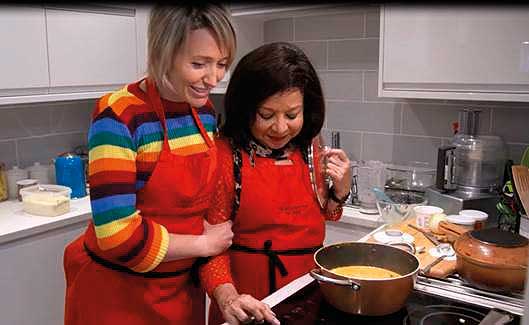
My aim is to give you the chance to enjoy Indian food without added fat. Sensible control on calories is essential to keep well. Fat contains more calories per gram than any other groups of food. Cutting down on fat, therefore, must top the list of priorities in formulating a healthy eating routine. If fat, which is naturally present in food is enough to enhance the flavours of spices, why add more?
Remember, risk follows fat. My book offers you no fat, no risk and great taste!
www.mridula.co.uk
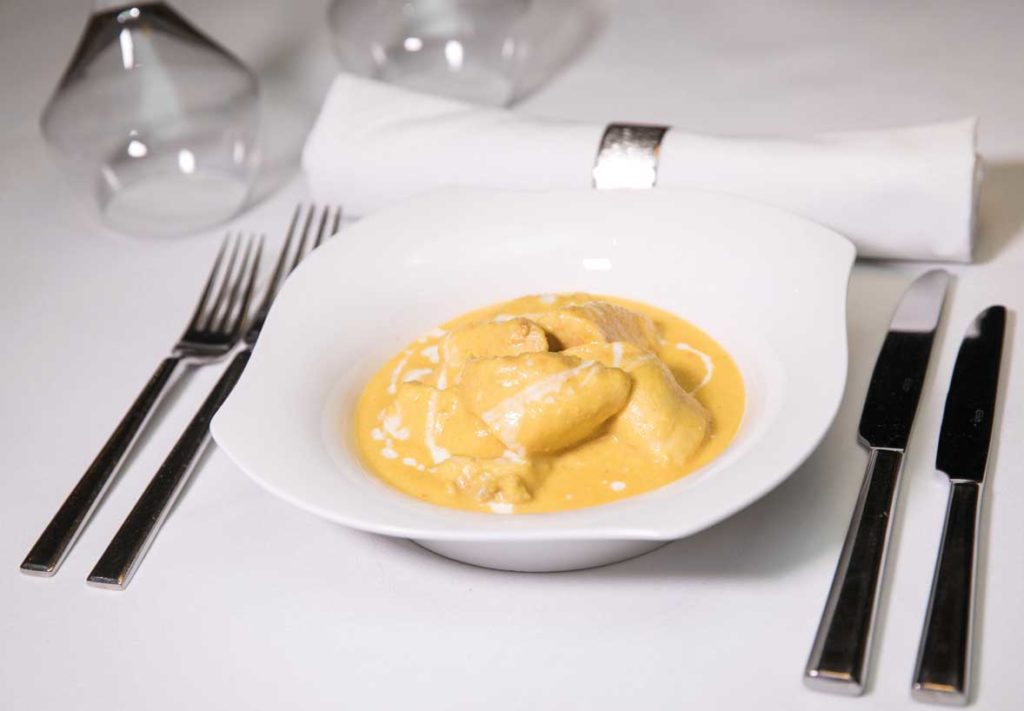

Westbourne Tandoori: Recipe for success
Anwar Hussain, owner of Westbourne Tandoori in Bournemouth tells Currylife why the business is going from strength to strength.
Westbourne Tandoori needs little introduction.
Opened in the 1990s and located in the upmarket coastal village of Westbourne in Bournemouth, it has a glowing reputation among diners and the local community.
The restaurant recently helped a local care home – Poole-based Lilliput House Residential Care Home, celebrate its Indian International Day.

Westbourne Tandoori owner Anwar Hussain offered a traditional complementary two-course meal for all the residents and carers to enjoy as part of the day’s proceedings.
The restaurant’s chefs prepared more than 50 meals for residents, featuring starters such as samosas and onion bhajis and main courses of chicken korma, chicken butter and chicken tikka, alongside rice and vegetables.
Westbourne Tandoori reaches out to the community
For Hussain, having a business mind and a compassionate outlook go hand-in-hand.
Throughout the Covid pandemic, he applied this mindset to help overcome the restrictions his customers and the front-line services faced.
Westbourne Tandoori offered free meals, free contactless delivery, discounts to Blue Light [those who work in the NHS, emergency services, social care sector and armed forces] card holders, alongside many offers on social media.
While the restaurant has been operating for more than two decades, Hussain started working there as a waiter in 2015. Born in Bangladesh, Hussain moved to Bournemouth from Manchester in 2011.
“I owned a takeaway business in Westbourne but decided to work at Westbourne Tandoori because I knew how popular it was and that it was one of the most famous [curry houses] in the south, with much goodwill behind the brand,” he says.
Over the following months his business acumen and entrepreneurship shone through, leading to more and more responsibility within all areas of the organisation. Just a year later, in 2016 he bought into the business and is now a proud partner.
Making his mark
In the years since, Hussain has wasted little time in putting his own stamp on the restaurant, and the business has gone through a dramatic transformation.
Hussain introduced a number of new menus, for both in-house dining and takeaway, alongside a party menu, an elaborate wine list and a dedicated cocktail menu.
He has also invested heavily in the restaurant’s interior design, installing booths, a marble illuminated bar and party table, a selfie wall and renovated the toilets, as well as building a new outside area for the summer with sliding windows.
Customer experience improved
The bar has helped make the restaurant more of a destination, meaning that customers are keen to stay for longer and enjoy not just dining but an experience too.
Cocktails, Champagne, beers by the bottle and on draft and an extensive wine list are on offer and customers are regularly invited to visit for cocktails and drinks.
There is also a ‘light bites menu’ and the restaurant offers poppadoms and chutneys to those just joining after work for drinks or before they head out for the evening.
On the menu, some of its most popular dishes include spiced honey-fried paneer, with the cheese coated with honey then dry cooked with fenugreek garam masala and Kashmiri chilli flakes and Malai dar deshi murgh – marinated supreme chicken coated with mozzarella cheese and garlic, grilled in the tandoor.
Laal patenga – chicken, lamb or prawn cooked with fresh crushed garlic and mango sauce, balanced with crushed chillies, gives diners a taste of a mouthwatering dish from Goa.
Added attraction
While all of these measures have helped to make the business resilient, like many others within the hospitality sector, Westbourne Tandoori’s key challenges are mostly out of its control – namely the increased cost of living.
“The critical challenges facing us are the growing costs of ingredients and utilities, as well as the knock-on effect on the spending power of our loyal customers,” says Hussain.
“We have never had any problems with staff, my team is constant, loyal and reliable and the head chef is my partner – so in this respect the team is no problem at all – we are one big family and the service we offer as a team is second to none.”

Economic challenges
Hussain’s response to the current tough times is to look at the wider picture and assess what he can do to help both the business and its customers.
As a result, Westbourne Tandoori is offering free kids’ meals in-house as well as providing live entertainment monthly, at no extra cost to its customers.
“We have a live DJ once a week, again at no charge to our customers and we offer free delivery within a four-mile/seven kilometre radius of the restaurant,” says Hussain.
“We have weekly deals and offers, for example every Wednesday we have a £19 three-course meal in house – saving our customers a huge amount per person. We also offer 2-4-1 cocktails all weekend. There literally is no better place to save money without compromising on the quality of the offer.”
While Hussain acknowledges that the current economic situation is tough, he believes that lockdown was far more challenging, as it was unknown territory for everyone .
“This current cost of living crisis is a cycle and the restaurant has survived far worse,” he says. “A VAT cut is always on the table for hospitality – the government could extend initiatives to assist our business.
Brexit
Brexit of course has impacted the costs of goods imported, but we just need to buy keener, local and keep our team happy in their jobs.
We also have adjusted stock and don’t sit on as much as we do in better times. Also, customers are happy with our offers, and they know that we will always make sure that they can afford to enjoy a Westbourne Tandoori meal.”
Keep on moving
Standing still is not in Hussain’s nature – he spends considerable time thinking about different ways to innovate the business, such as the investment in décor, new assets, refreshed menus – which also cater to dedicated dietary requirements, attractive offers and party facilities.
“We also partner with relevant charities and community organisations,” adds Hussain. “This year we will continue to improve our value for money, maintain service and quality.
And in the next 24-months – we may have another [business] interest in the Bournemouth area – watch this space!”
Talking tech
Technology plays an important part too, with ordering processes all computerised from device to kitchen and an app for table bookings and takeaway orders.
“We also really favour social media as a tool for marketing – we have a strong and loyal following on Facebook, Instagram and TikTok,” says Hussain.
“As my restaurant is so up to speed in terms of food presentation and décor we are also very ‘Instagrammable’ and ‘shareable’.”
Sustainability is another area the restaurant is increasingly focusing on. As Hussain acknowledges, by its nature, the curry house industry is packaging heavy, and Westbourne Tandoori endeavours to use recyclable materials when possible. It is also monitoring its waste from the kitchen and from customers.
“We have got our serving proportions down to a fine art – we try to waste as little as possible,” he says. “Everything that can be recycled from the restaurant is dealt with in the most responsible way.”
Taking stock
Looking over his achievements thus far, Hussain says he is immensely proud to have been a winner two years in a row at the Curry Life Awards, saying to be recognised by the industry and local customers is priceless.
Being able to support his local community during lockdown. and charity work that stretches to local fundraisers, the elderly and various children’s charities, is also a big source of pride.
“Westbourne Tandoori is very fortunate in terms of its business model; it’s one that can react quickly to market influences – such as this current crisis, and we also use the seasons, the sporting calendar and local charities to maintain a healthy support system in the community,” says Hussain.
“We continue to give generous discounts to Blue Light card holders but above all we prepare, cook and serve beautiful Indian cuisine and that’s what keeps our wonderful customers coming back.”
Read more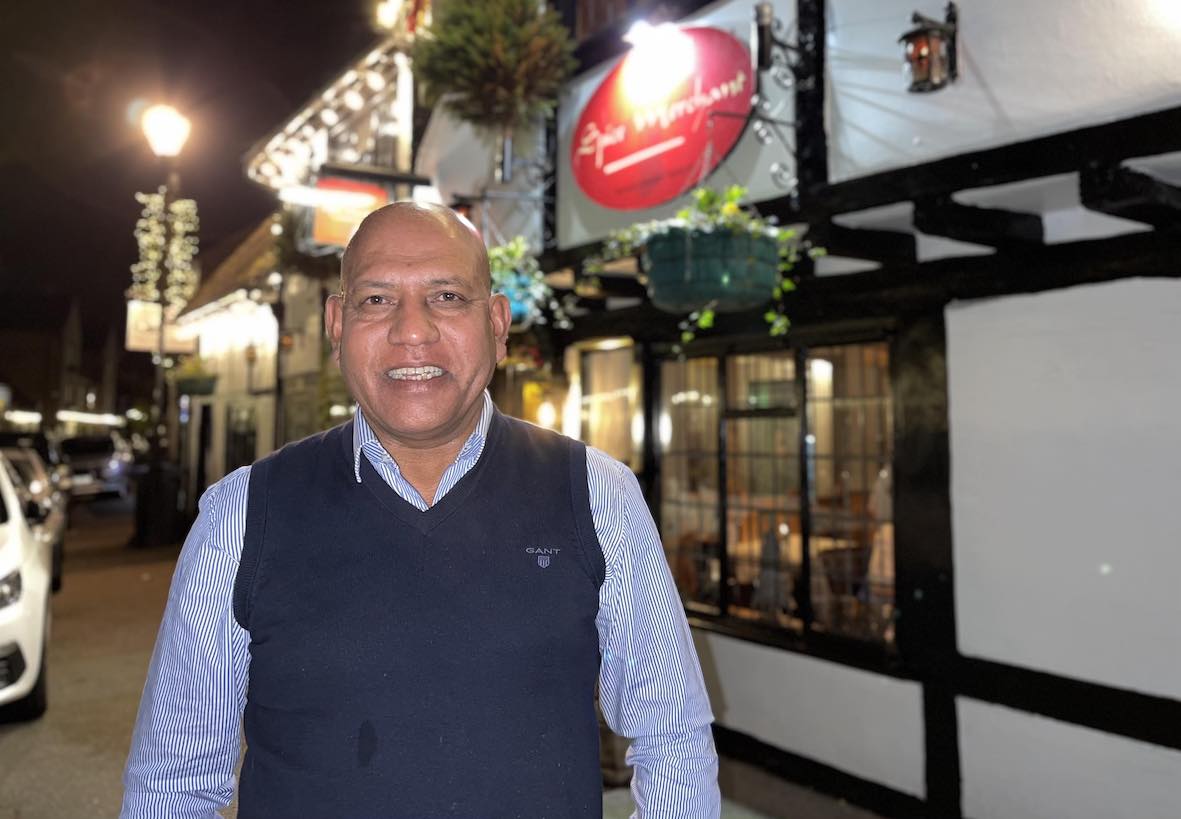
Above and Beyond
Curry Legend Bashir Islam has been an inspiration to the curry industry for many years, with an approach based on mutual respect
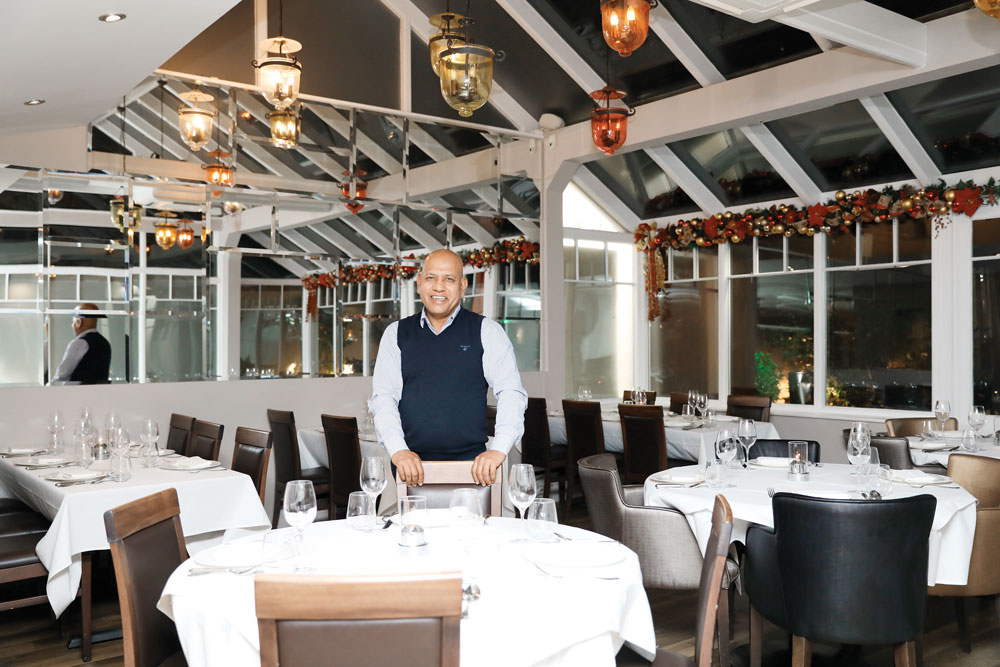
Restaurateur Bashir Islam’s motto is simple: ‘promise less and give more’. His philosophy in life is to give people more than they envisage, to over-deliver and to exceed expectations across all areas of the business, from the kitchen, to the service to the front of house.
We’re meeting at one of Islam’s three restaurants (although over the years, Islam has been involved in plenty more). The Spice Merchant is located in the historic area of Beaconsfield Old Town in Buckinghamshire, with the other two (also with the same name) in Henley-on-Thames and Cookham, and describes itself as serving ‘contemporary Indian cuisine’. On the menu, it says, you’ll find ‘traditional Indian pot dishes, such as Bhuna and Jalfrezi as well as a selection of more modern and creative dishes’. The decor reflects this approach too, with wooden floors, large mirrors and opulent lighting.
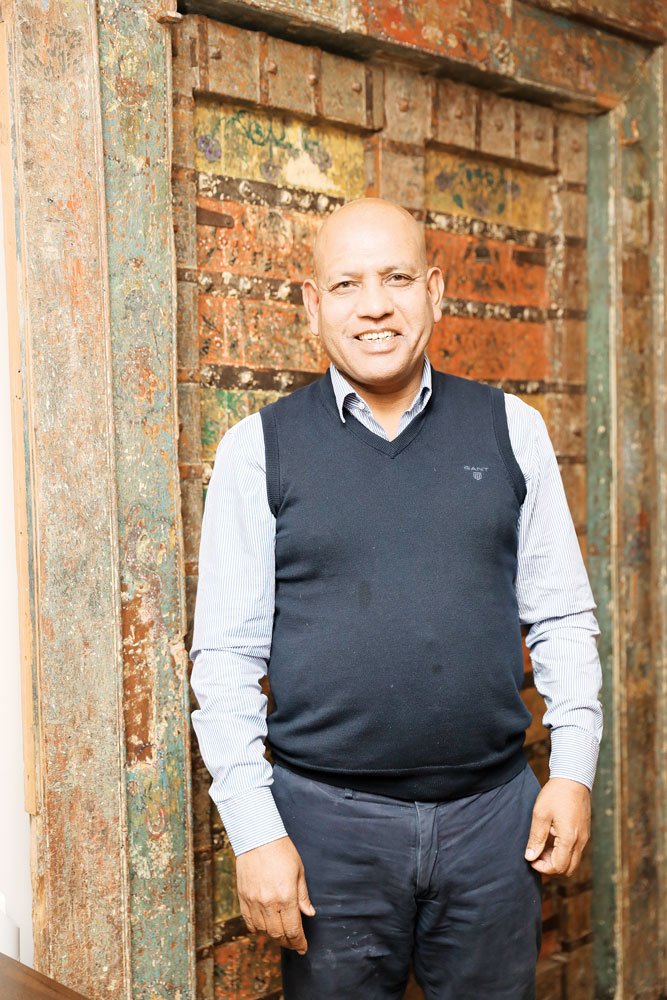
Bashir Islam came to the UK in 1976, working in a succession of Indian restaurants in various locations, starting in Palmers Green, moving on to Crystal Palace, then Leyton and also Portsmouth. He then completed stints at restaurants in Uxbridge and Gants Hill, before settling in Beaconsfield. His first restaurant – Tropical Curry, was opened in 1980 in the modern part of the town and, he recalls, was the first such Indian restaurant in the area. In 1983, he opened his flagship restaurant, The Cookham Tandoori, in partnership with his brother (now called The Spice Merchant Cookham) and then in 1994 the one where we are sitting today. The Henley restaurant opened in 2005.
Many chefs cut their teeth at the Cookham restaurant, before embarking on their own hospitality ventures and founding successful businesses of their own. Bashir has also helped to fund many of these, providing start-up capital (rather than going into partnership) and being an inspiration for many in the curry industry,
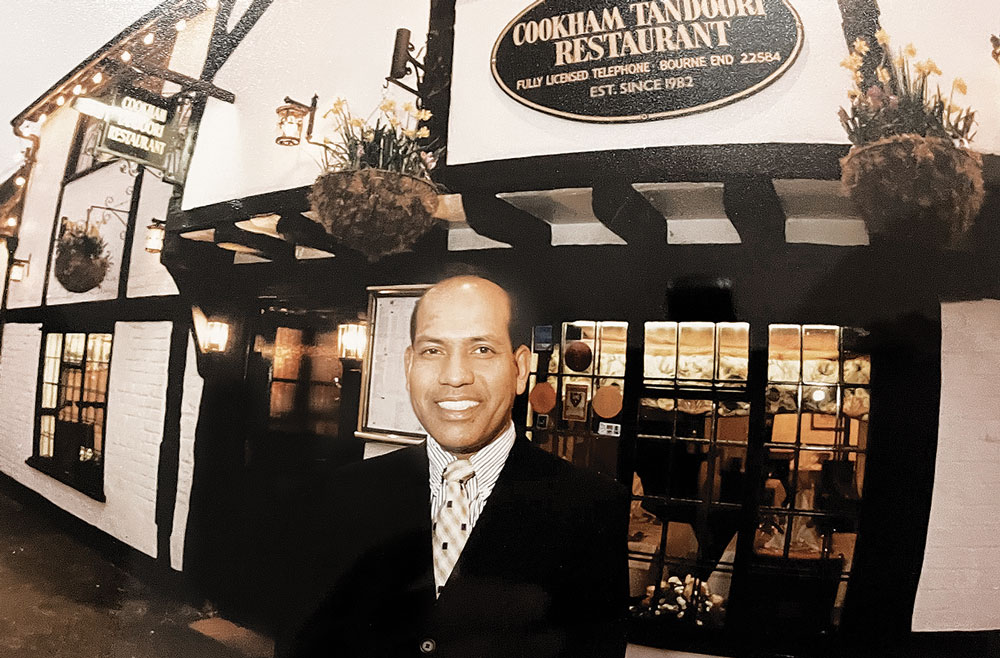
He shies away from being called an inspiration to the industry and a business mentor, however and doesn’t believe he has done anything too differently from anyone else. He says his approach is down to a simple premise: if you treat people well, they will respect you and stay with you. And similarly, he says, do not work for someone who doesn’t respect you and always ensure you take pride in your work.
“I never forgot who I am, and where I came from and that is why a lot of people lose their way,” he says. “You must not forget who you are or your identity – once you lose this you have nothing.”
A family approach
Bashir likes to put the emphasis on creating a family environment at his restaurants, where everyone is welcome, whatever their role.
“When you work here with me it’s like a family because I worked for others before and have been treated very badly,” he says. “I thought this was not right – people who work for me, this is like their home, they should feel comfortable. If people need help, I want to be there for them. Indian restaurants do not do things by the book – everyone is our friend, we are like one big family. Everyone is capable of achieving anything and we try to give people what they want.”
Testament to this is the fact that many of his former staff speak very highly of Bashir, and remember him for the level of training he offered – not just with regards to the food business but around customer service too. As one employee explained while we were there, his success is down to what Bashir has taught him. Bashir too says he has not come across a single person yet who has previously worked for him and doesn’t want to talk to him again.
“Most of my staff started with little or no experience, I trained them from zero and occasionally brought some in from other restaurants,” he says. “Anyone who works with me knows what is expected of them; it’s an amazing cultural experience working in a restaurant. As an owner I can provide nice lighting and supply the food, but cooking and serving dishes is all down to the team. So if you book for dinner and the person serving you is not properly dressed or does not have a clean appearance, you are not going to eat there.”
A people business
Bashir Islam is also astute, being able to spot the right people to work with and bringing out the best in them. He acknowledges that one of the biggest challenges throughout his time in the industry has been finding the right staff. While he might have many ideas that have proved successful, he says you can make so much more of these, and the prospects are much more exciting, if you have the right staff by your side.
He’s also spotted gaps in the marketplace, and as he puts it, ‘been able to seize an opportunity.” The Spice Merchant for example has its own online delivery system, called Feast Online.
“I see things a good many years before others,” he says. “If you look at the likes of Just Eat, I created Feast Online. I could see that many Indian restaurants were proving to be very popular but we needed to get quality food delivered to people’s doors. I invested money in establishing this online food delivery system for my restaurants.”
Enjoy what you do
While not a trained chef, Bashir also enjoys creating dishes, and has put his own stamp on the menu at The Spice Merchant, including a take on Chicken Tikka Masala, with lots of spices to give the dish a bit of a kick.
“I am not a chef and have never been one but I have a very good understanding of food,” he says. “I use top-quality products – I like going to markets and seeing fresh produce, I can’t compromise on quality. And you also need to understand spices and why you are putting a particular one into this curry over that one. If you don’t enjoy it, it’s quite simple – don’t do it.”
At the age of 65, Bashir acknowledges that he is close to retirement (neither of his three children are interested in taking on the family business) but that hasn’t stopped him thinking about new ventures – he plans to open a fish and chips shop in Henley.
“I don’t know how it will work, I am too old to do this job,” he reflects. “The only thing I say to people who are thinking of opening a business is to make sure you give everything you have within yourself. Never undermine your competitors, respect them. And if you don’t know something, study what is already out there, but always think about how you can do it better. Learning never finishes. Don’t do something for the sake of it. If you are not happy with something don’t sell it, if you can only serve 10 people tonight then don’t serve 12. You might lose two customers today but the other ten will come back again.”
Spice Merchant Cookham, High St, Cookham, Maidenhead SL6 9SL, Phone: 01628 52258
Read more
Beat Type 2 Diabetes with this special remedy: Spicy Curry
A lot of us cannot help but indulge in all the sweetness that is on offer nowadays, although some may be in the form of unhealthy foods. Linked to poor diet and lack of exercise, diabetes is one of the most prevalent lifestyle diseases, affecting around 3.7 million people in the UK. Over-indulgence on cakes and other sweet treats over the festive period can raise blood sugar levels.
During winter, Type 2 diabetes symptoms can worsen but a simple dietary change can do wonders. “Curry is a great meal choice for diabetes patients to avoid blood sugar spikes,” reveals Dr Sarah Brewer, CuraLin nutritionist in a report.
“Home-made curry makes a great winter warmer, and curry spices such as cinnamon, fenugreek, chilli and turmeric have beneficial effects on glucose control,” said Dr Brewer. Dr Brewer further explains how stews full of low glycaemic-index vegetables and beans can be very good for the body during such excruciating weather. Adding this to one’s weekly meal plan can avoid blood sugar spikes.
To team up the curry, she also recommends brown or wild rice rather than white rice as the latter shoots up blood sugar levels and it contains less amount of fibre which does not aid in good bowel movement. She also advices to opt for granary-style seeded and brown wholemeal loaves, if one prefers having bread.
Elaborating on spices, Dr Brewer added, “Cinnamon contains the antioxidant polyphenols, which improves insulin sensitivity in diabetes patients, while turmeric improves the release of insulin.”
High blood sugar can be controlled by consumption of more low glycaemic index vegetables, which includes most fruits and vegetables, milk, and some wholegrain cereals and bread.
In a report, the NHS recommends eating at least five portions of fruits and vegetables every day. Diabetes patients are more at risk of some deadly complications – including heart disease and stroke – so managing their blood sugar levels is crucial.
While most people over the age of 40 fall the under the risk of becoming diabetic, other common symptoms that can be noted are unexplained weight loss, passing more urine than every day, or having cuts or wounds that take longer to heal than normal.
Data shows South Asian children more likely to be obese In a drive to fight severe obesity, which has reached an all-time high amongst 10
and 11-year-olds, Change4Life has started a campaign “Make a swap when you next shop” to create awareness and encourage parents to halve their children’s sugar intake from some everyday food and drinks.
Data shows Bangladeshi, Pakistani and Indian children aged 10 and 11 years old were the most likely to be overweight or obese. According to Public Health England (PHE), children have already exceeded the maximum recommended sugar intake for an 18-year old by the time they reach their tenth birthday,
The campaign, which was launched to support South Asian families to cut back on sugar and to help tackle growing rates of childhood obesity, is urging parents to buy products such as yoghurts, drinks and breakfast cereals by half – while giving them healthier alternatives of the foods and drinks they enjoy.
Adopting these dietary changes every day could remove around 2,500 sugar cubes per year from a child’s daily intake, but swapping chocolate, puddings, sweets, cakes and pastries with healthier options such as malt loaf, sugar-free jellies, lower-sugar custards and rice puddings would reduce risks further.
Orla Hugueniot, Campaigns Nutritionist at PHE, said, “Children are consuming too much sugar, but parents can take action now to prevent this building up over the years.”
“Overweight or obese children are more likely to be overweight or obese as adults, increasing their risk of heart disease and some cancers, while more people than ever are developing Type 2 diabetes. Overweight or obese children are more likely to be bullied and have low self-esteem. Excess sugar can also lead to painful tooth decay,” added Orla.
Nutritionist Azmina Govindji, said, “It’s important we as a community understand the sugar content in popular cultural foods and make changes to address the problem of childhood obesity. With busy lives and families to support, Change4Life is offering a straightforward solution – by making simple swaps each day, children can have healthier versions of everyday foods and drinks, while significantly reducing their sugar intake.”
“Grandparents can play a significant role in their grandchildren’s diet, and we recognise that change has to come from the whole family and not just parents. That’s why the Change4Life campaign will be taking this message to the heart of the community, including places of worship, to encourage everyone to support healthier choices.”
Chef and author Anjula Devi who is passionate about creating balanced and nutritious Indian meals and is supporting the campaign said: “Most South Asian households will have a blend of western and cultural foods in their homes which can lead to a high consumption of sugary products.”
“When I cook, I try to reduce the amount of sugar and salt content in my cooking and make swaps using low fat/sugar products where I can so we can enjoy the best of both worlds,” added Anjula.
Families are encouraged to look for the Change4Life ‘Good Choice’ badge in shops, download the free Food Scanner app or search Change4Life to help them find lower sugar options.
HEALTHY SWAPS
• A sugary juice drink for a no-added sugar juice drink, to cut back from 2 cubes to half a cube
• A higher-sugar breakfast cereal (e.g. a frosted or chocolate cereal) for a lower sugar cereal, to cut back from 3 cubes to half a cube per bowl
• A higher-sugar yoghurt (e.g. split-pot) for a lower sugar one, to halve their sugar intake from 6 cubes of sugar to 3
Nutritionists believe ‘healthy’ food at supermarkets misleading
Looking for healthy food options in supermarkets? Watch out. While supermarkets pledge their commitment towards “promoting healthy eating”, findings from nutritionists and researchers suggest something else.
According to a BBC Channel 5 investigation, products available in leading supermarkets labelled as ‘healthy’ food, contain saturated fats and high salt level, which can be detrimental to health. The report quoted the British Dietetic Association saying stores including Tesco, Morrisons and Sainsbury’s were being “unhelpful” and “confusing” customers.
Researchers also found that despite being labelled “ready to eat” or “washed”, bags of cut leaves are a breeding ground for salmonella – and prepared salad is now the second-biggest cause of food poisoning in the UK.
Similarly, gluten-free breads are packed with a cocktail of additives and chemicals, including some used in the make-up and oil drilling industry, food campaigners claimed.
In another revelation, fruits available all year round, which look fine for consumption may have been harvested and taken for long-term storage into chilled warehouses filled with a mixture of gases to stop ripening.
The Royal Society for Public Health (RSPH) called for an independent supermarket regulator. “Supermarkets should be transparent about how they classify foods, and provide clear information about products,” the RSPH reportedly said.
“There must be incentives and penalties for presenting clear and accurate information. Perhaps there is potential to have an independent supermarket regulator. It is important that the good work done so far on labelling is not undermined,” it added.
A British Dietetic Association (BDA) spokesperson said supermarkets had a “duty of care” to their customers. “It is unhelpful and confusing to the consumer, and supermarkets should avoid doing this,” they added.
“They should be promoting and educating people to buy foods that actually are healthy – not just marketed as being so.”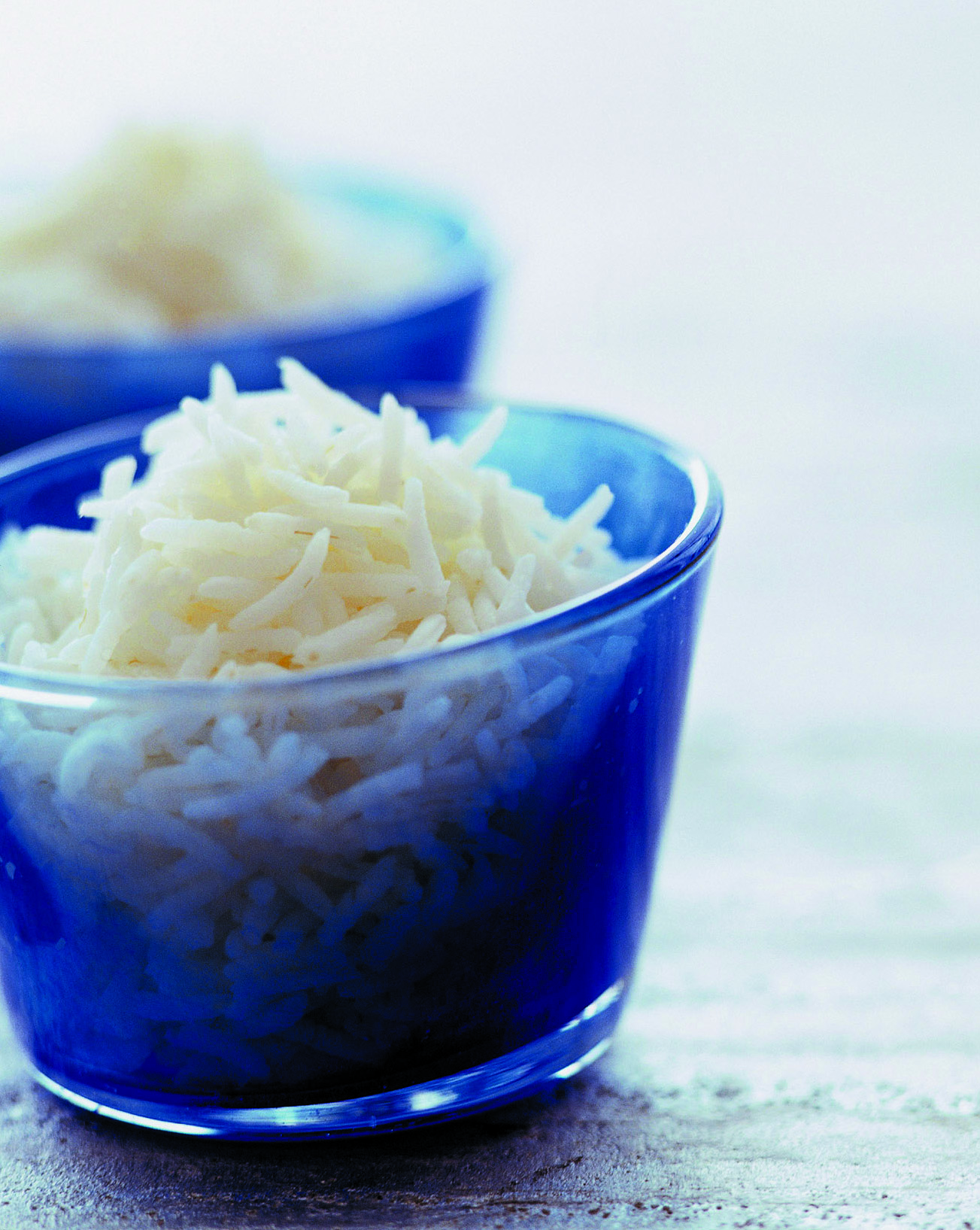
Eating more rice could help fight obesity
Eating rice could help prevent obesity, a Japanese study has found. According to a Bloomberg report, researchers from the Doshisha Women’s College of Liberal Arts in Kyoto said that people following a Japanese or Asian-style diet based on rice were “less likely to be obese” than those living in countries where the consumption of rice is low.
The researchers added that even a modest increase of 50 grams of rice per day could help to reduce the worldwide prevalence of obesity by one per cent — from 650 million adults to 643.5 million adults.
They noted that low-carbohydrate diets limiting rice are a popular weight-loss strategy in developed countries, but the effect of rice on obesity was unclear.
The study examined rice consumption — in terms of grams per day per person — and calorie intake in 136 countries, as well as data on body mass index (BMI).
In the U.K., people were found to consume just 19 grams of rice a day, below dozens of other countries including Canada, Spain and the U.S.
“The observed associations suggest that the obesity rate is low in countries that eat rice as a staple food,” said Professor Tomoko Imai, who led the study.
Giving possible reasons why rice can help, Prof Imai said rice was low in fat, adding: “It’s possible that the fibre, nutrients and plant compounds found in whole grains may increase feelings of fullness and prevent overeating.”
“Given the rising levels of obesity worldwide, eating more rice should be recommended to protect against obesity even in western countries,” Prof Imai was quoted as saying.
The authors of the study concluded: “The prevalence of obesity was significantly lower in the countries with higher rice supply even after controlling for lifestyle and socioeconomic indicators.”
Tam Fry, chairman of the U.K.’s National Obesity Forum, said: “We have known for centuries that Far Eastern populations tend to be slimmer than in the West because rice is a staple food, but few obesity specialists may have appreciated why. This novel research is the first to hypothesize that we could nail obesity by eating a modest amount more.” The study was presented at the European Congress on Obesity in Glasgow.
Cabbage helps cut risk of cancer
Eating vegetables like cabbage, broccoli and kale can help reduce the risk of bowel cancer, a new study has claimed.
Researchers from Francis Crick Institute found that anti-cancer chemicals helps reduce inflammation of the gut and colon, thereby decreasing chances of colon cancer.
The study, which was published in a medical journal Immunity, explained how cruciferous vegetables when consumed generate indole-3-carbinol (I3C), which has high health benefits.
They studied mice who had a diet rich in green vegetables alongside mice that did not. The rodents that were fed a rich diet developed neither inflammation nor cancer whereas those without showed signs of gut cells dividing uncontrollably.
“Even when the mice started developing tumours and we switched them to the appropriate diet, it halted tumour progression,” Dr Gitta Stockinger, from the research team, told the BBC.
Dr Stockinger added, “We often think of colon cancer as a disease promoted by a Western diet rich in fat and poor in vegetable content, and our results suggest a mechanism behind this observation.”
“Many vegetables produce chemicals that keep AhR stimulated in the gut. We found that AhR-promoting chemicals in the diet can correct defects caused by insufficient AhR stimulation.
‘This can restore cell differentiation, offering resistance to intestinal infections and preventing colon cancer.”
Dr Stockinger also believes the findings have become a “cause for optimism” and adopting a diet with plenty of vegetables will mitigate the risk of cancer.
She told the BBC: “A lot of dietary advice we’re getting changes periodically – it is very confusing and not clear cut what the causes and consequences are. Just telling me it’s good for me without a reason will not make me eat it. With this study, we have the molecular mechanisms about how this system works.”
She also added a word of caution, saying, “Make sure they’re not overcooked, no soggy broccoli.”
It maybe noted that signs of bowel cancer include persistent blood in the stools, changes in bowel habits, such as going to the toilet more often and stomach pain, bloating or discomfort.
Prof Tim Key of Cancer Research UK said there were plenty of reasons to eat more vegetables. “This study in mice suggests that it’s not just the fibre contained in vegetables like broccoli and cabbage that help reduce the risk of bowel cancer, but also molecules found in these vegetables too.”
“Further studies will help find out whether the molecules in these vegetables have the same effect in people, but in the meantime there are already plenty of good reasons to eat more vegetables.”
Curry ingredients may provide the key to improving your memory
Curcurmin, which gives turmeric its vibrant yellow colour may have several health benefits, according to new medical research.
There have been suggestions that the chemical has anti-oxidant and anti-inflammatory properties and could also help improve memory.
Scientists at California University in Los Angeles have been studying the effects of curcurmin on people with age-related memory loss. The results of the research were published in the American Journal of Geriatric Psychiatry.
“Exactly how curcumin exerts its effects is not certain, but it may be due to its ability to reduce brain inflammation, which has been linked to both Alzheimer’s disease and major depression,” said Dr. Gary Small, study author and the director of geriatric psychiatry at UCLA’s Longevity Centre.
There are much lower rates of Alzheimer’s disease in India, where curcurmin – a key ingredient of turmeric – is consumed in large quantities. It was also found that cognitive performances in the elderly was better.
Those who carried out the study found that those in the test group who took curcumin noted an improvement in mood and memory.
The research showed that memory tests with participants who took curcumin improved by around 28 per cent over the course of the study. Their overall disposition also improved, according to scientists.
A second study is planned by the University of California to find out more about the curry ingredient’s properties, with a larger number of people taking part in the research.
A key area of exploration is whether curcumin works significantly better for different age groups, and particularly with those having a genetic risk of dementia, or as a possible treatment for people suffering with depression.
“These results suggest that taking this relatively safe form of curcumin could provide meaningful cognitive benefits over the years,” Dr Small said.
A study at Baylor University Medical Center in Dallas researchers used a combination of curcumin and boswellia, better known as frankincense. These compounds have been used for centuries in Indian Ayurvedic medicine as an anti-inflammatory.
“We’ve known for a while that curcumin and boswellia are powerful anti-inflammatories and have potent anti-cancer properties,” says study author Ajay Goel, Director of Epigenetics, Cancer Prevention, and Geonomics at Baylor. “They are both powerful natural medicines, and both have the ability to reduce inflammation,” he told Newsmax Health.
Annual sales of curcumin have increased since 2012, due to an increase in its popularity as an alternative health remedy. It is present in skincare products that are marketed as containing natural ingredients or dyes, especially in Asia. The largest market is in North America, where sales exceeded US$20 million.
The US government has supported $150 million in research into curcumin through the National Center for Complementary and Integrative Health.
Read more
A LITTLE LESS SALT
A pinch of salt can make a dish delicious; double the dose and it ruins the taste. More importantly, excessive salt can lead to several health problems. Though the human body needs this mineral for proper functioning, it should be consumed in moderation.
According to a World Health Organisation report, consumption of salt between 1,500 and 2,400 milligrams per day is recommended for adults. However, if one has or is at risk for high blood pressure, only up to1,500 milligrams is advised.

The Institute of Medicine’s Food and Nutrition Board suggests that both male and female teens between 14 and 18 years old should have only about 1,500 milligrams of sodium each day. Lifestyle modification should happen from an early age as there is no particular age for non-communicable diseases (NCDs) like hypertension.
Excess usage of salt can create several health hazards, hypertension being the most prominent. Others like abnormal heart development, osteoporosis, dehydration, swelling and digestive diseases have detrimental effects on the body.
Hypertension:
High blood pressure can trigger life threatening emergencies like strokes and heart attacks. Studies indicate that reducing sodium intake can lower blood pressure by 25 per cent. According to the Harvard School of Public Health, high intake of salt can cause 23 per cent increased incidence of stroke and 14 per cent rise in the incidence of heart disease.
Abnormal heart development:
A habit of eating salty food heightens the risk of non-blood pressure related heart diseases as well. The heart has to work much harder to provide proper circulation, when consumption of salt is more. This over a period of time results in an abnormally large heart with thinner heart valves. An enlarged heart is significantly weaker and can lead to symptoms like chest pains, breathlessness and chronic fatigue.
Osteoporosis:
Sodium inhibits the body’s absorption and utilization of calcium, leading to a loss of bone mass and increased porousness of bones. Elderly people, post-menopausal women and diabetics, who are already at high risk of osteoporosis, should be particularly careful about salt intake.
Dehydration and swelling: Excessive sodium in the blood draws water out of the cells and into the tissues. Feeling thirsty is a direct response after having salty food. Dehydrated cells signal the brain for water. Having fluid filled tissue makes one look bloated and swollen. These symptoms are especially severe in the lower parts of the body. Reducing salt intake is an effective way of preventing swollen feet, ankles and calves.
Digestive diseases: Sodium regulates the acid-base balance of blood and body fluids. Too much salt can yield acid reflux, cause heart burn and long-term damage to the upper digestive tract. Studies indicate that habitual intake of salty foods is a strong risk factor for duodenal and gastric ulcers and cancers.
There are ways to cut down salt consumption. One should opt for low-salt products and check ingredient labels to avoid products containing baking soda, sodium nitrate, sodium citrate and sodium benzoate. Salt free herbs and spices are a good substitute. At times, potassium is prescribed instead of sodium by doctors. Also, several brands these days highlight the presence of less sodium in their table salt.
Frozen, processed and fast-foods that we consume daily have high salt content, due which these should be used minimally. It is beneficial to choose fresh fruits and vegetables over processed ones and is advisable to rinse canned vegetables and fruits before consumption. A high intake of fruits and vegetables are protective dietary changes for a healthy life.
One should be cautious while picking products. A bottle of jam which maybe high in sugar content, also has salt in it in the form of preservatives which often go unnoticed. Consumption of plenty of water is a solution which is beneficial for the body and a natural cure for most NCDs.
Basil, garlic powder, onion powder and curry powder form excellent alternatives for salt which enhance food flavours.
Basil: Considered an important culinary herb, it is now commonly used fresh in cooked recipes. Alternatively, it can be chopped into homemade pasta sauces or tossed in with olive oil for healthy options as it has a sharp yet slightly sweet taste.
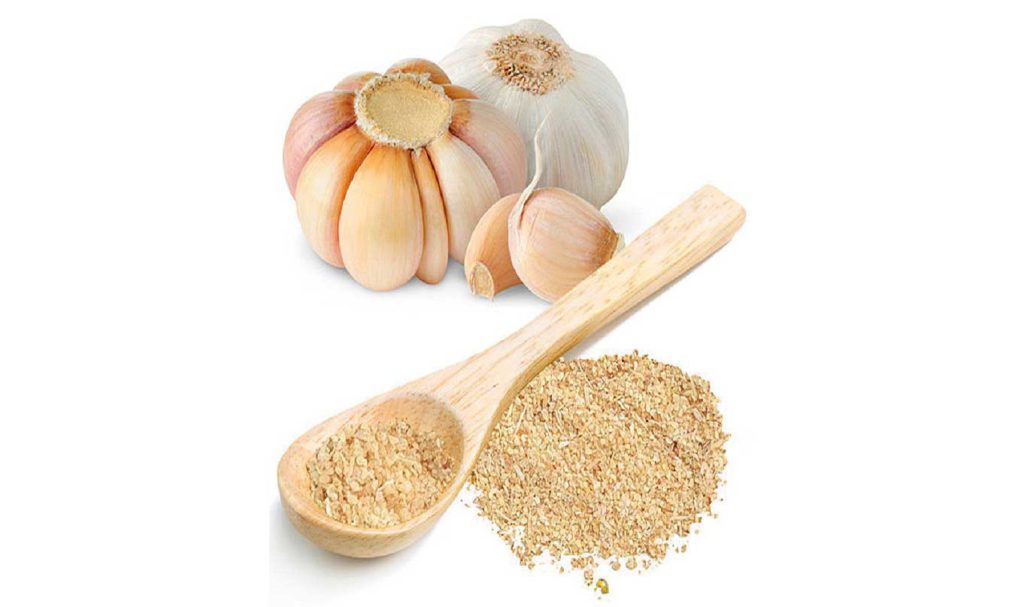
Garlic powder:
Enhances food flavours while offering other health benefits at the same time. When a bulb of garlic is roasted with a little bit of olive oil it goes from bitter in its raw form to a delightful sweetness. Using roasted garlic makes for a natural sodium source treat.
Onion powder:
A great salt alternative, but should be used sparingly due to its pungent flavour and strong taste.
Curry powder:
A rich flavour, which when sprinkled in dishes with vegetables and meat products, enhances the taste, reducing or eliminating salt usage.
One should become more mindful of salt intake in the diet, engage in regular physical activity and have a high intake of fruits and vegetables as these are key components of a healthy lifestyle.
Read more


